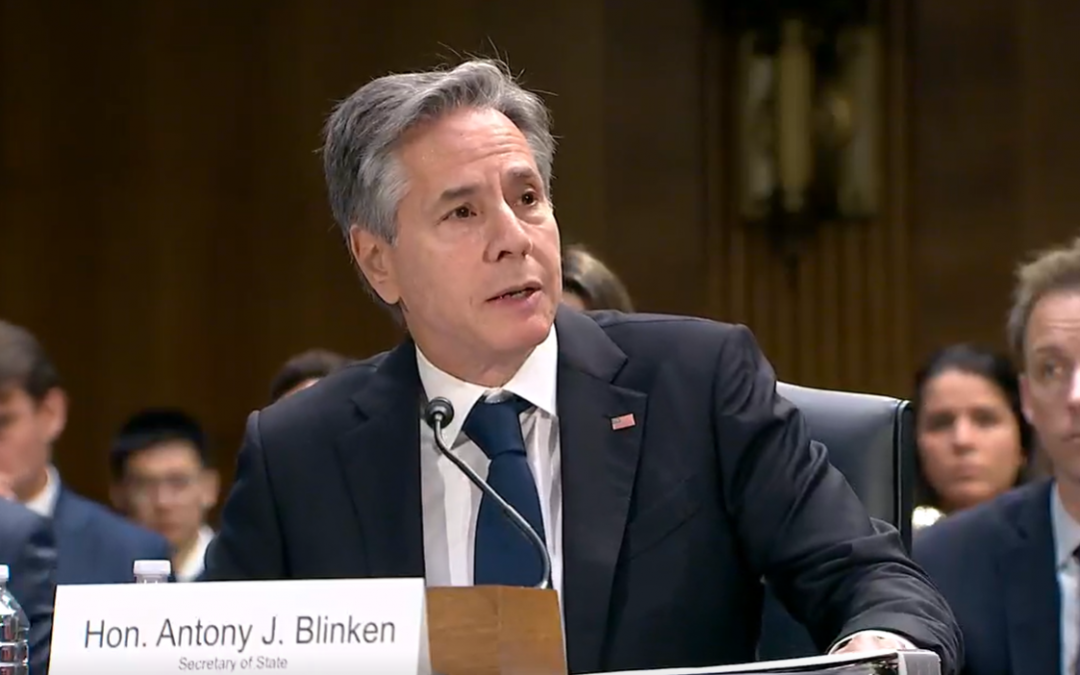WASHINGTON– Secretary of State Antony Blinken asked for Senate support for Biden’s joint Israel and Ukraine aid package in a hearing Tuesday morning, despite clear opposition in the House to the president’s plan.
“It’s very important to understand the elements of this request work together as a package,” said Blinken. “Making these investments together allows us to strengthen the defense-industrial base and to see the benefits of making these investments together rather than making them piecemeal.”
“What happens in Ukraine and what happens in the Middle East, also matter in the Indo-Pacific,” Blinken continued. “Beyond Europe, we know that our allies, our adversaries, and our competitors are watching that conflict and watching our response.”
Senate majority leader Chuck Schumer had already said the Senate will advance Biden’s joint proposal as soon as possible. Sen. Patty Murray, D-Wa., who chairs the Senate Appropriations committee, emphasized the importance of passing Biden’s proposal in the hearing Tuesday morning.
“America must stand strong by our allies, dictators cannot be allowed to invade sovereign democracies, and terrorism cannot be tolerated,” said Murray in support of Biden’s proposal. “We cannot ignore the humanity and cries for help from civilians caught in the middle of conflict and crossfire who we must protect.”
Under Biden’s proposal, Ukraine would receive $61.4 billion in aid while Israel would receive $14.3 billion in assistance, much of it for Israel’s Iron Dome missile defense system. Another $9.15 billion would support humanitarian efforts in Ukraine, Israel, and Gaza, while $7.4 billion would go toward initiatives in the Indo-Pacific to counter China’s influence.
Meanwhile, the House charted a different course. New Republican House Speaker Mike Johnson said he would separate funding for Israel from Ukraine funding, proposing a bill Monday that would provide $14.3 billion in aid to Israel by cutting funding for the Internal Revenue Service.
“I’m really disturbed that the House is playing political games. This isn’t a game, people’s lives are at stake in Israel and in Ukraine today,” said Sen. Chris Murphy, D-Conn., after the hearing. “The House is debating a measure that they know is dead on arrival in the United States Senate.”
Even so, Sen. Joe Manchin, D-W.Va., a moderate Democrat known for working with Republicans, expressed confidence that the Senate would pass Biden’s proposal and that the House of Representatives would as well.
“I think eventually they will come along, eventually they will understand there is a purpose,” said Manchin on whether the House will pass Biden’s proposal.
While opposition to Biden’s proposal emerged starkly in the House of Representatives, many Republican Senators have also expressed concerns about Biden’s proposal, especially regarding border policy.
“I understand the importance of stopping Putin,” said Sen. Katie Britt, R-Ala., after the hearing. “An emboldened Russia emboldens China and emboldens Iran, and I understand the need and urgency to get Israel everything it needs to defend itself.”
But Britt parted with Biden on border policy.
“We don’t see any sense of urgency about securing our border,” Britt continued. “Securing our border is what we need to do to keep the people here at home safe and ultimately have safety abroad.”
Sen. John Cornyn, R-Texas, made a similar point to Britt on X, formerly known as Twitter, writing: “Without meaningful and substantive policy changes that address the #BidenBorderCrisis such aid is in serious jeopardy.”
Notably, Biden’s proposal also included $14 billion to bolster border security, but some Republicans such as Sen. Bill Hagerty, R-Tenn., said more money could worsen the border crisis and not end it because the proposal would be more funding for bad policies.
Despite the criticism, Democrats were confident that Biden’s proposal would pass, as Republican leader Mitch McConnell also said he supported increased aid to embattled Ukraine.
“In the Senate we will try to do hard bipartisan work,” said Murphy. “We’ll try to find a compromise where we can get Ukraine and Israel aid done, and listen to the concerns that our Republican colleagues have raised about additional support for the border.”

